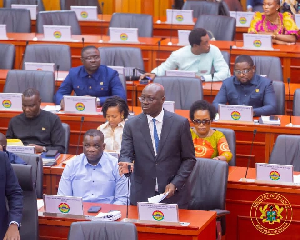The Government has between March and June this year recovered 18 billion cedis out of a total of 4.8 trillion cedis owed it by corporate bodies and individuals, Mr Yaw Osafo-Maafo, Minister of Finance,
announced onMonday.Presenting the country's economic situation to participants attending the Homecoming Summit, the Minister said he would resort to legal action when other debtors, who had already been served with demand letters, failed to pay up the monies at the stipulated time.This is the second time in three months that the minister has threatened court action to recover money owed to the state. The first was in May, this year, during the National Economic Dialogue.
The summit on the theme: "Harnessing the Global Ghanaian Resource for accelerated national development," seeks to tap the expertise of Ghanaian residents abroad to help in the country's economic recovery efforts.
Mr Osafo-Maafo said the collection of the debt forms part of broad measures by the government to enhance its revenue and to ensure that the economy stabilises to facilitate economic growth and development.
He mentioned review of expenditure of all ministries to enable them to live within their means, expansion in government sources of revenue through the introduction of various levies and removal of exemptions granted Non-Governmental Organisations, except on education and health materials, as some other measures being adopted to improve the economic situation. These measures, the Minister said, are important to correct the weaknesses in the fiscal and monetary policies, such as high inflation, high interest rate and rapid depreciation of the cedi against major international currencies in the medium term to ensure that economic stability is not superficial but lasting.
This would also help lay a solid foundation for the private sector and government's vision of an export-led economy that would support and help create jobs for the teeming youth.
Major Courage Quashigah (RTD), Minister of Agriculture, blamed the bad food situation on lack of involvement of the private sector and the influx of imports to the detriment of domestic production.
Other factors, he said, included land acquisition, high cost of inputs, infrastructure and lack of haulage and processing.
The Minister said the government hoped to address the situation through a link with out-growers to ensure food security and encourage processing at the nucleus level.
He said an Agricultural Commission would be established to assist those wishing to invest in commercial farming. The modalities for the Commission were being worked out.
General News of Tuesday, 24 July 2001
Source: GNA
Government Recovers 18 Billion Cedis From Debtors













